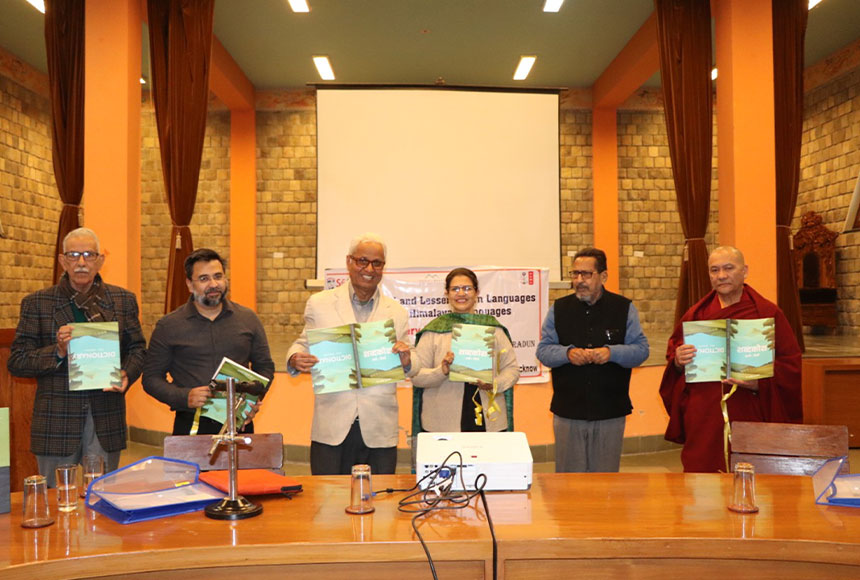


Over the last few years, Endangered and Lesser-Known Language (ELKL) Conferences have emerged as a major venue for Indian scholars to present, discuss and improve high-quality research related to endangered and lesser-known languages of the country. It has proved to be a very popular platform for the researchers and has seen a growth of up to 300% in terms of number of papers sent to the conference.
However, as the conference has grown, a concern among a few of us have grown regarding sustaining the quality of papers included for the conference. This document aims to give broad guidelines for conducting the conference in such a manner that, unlike lot of other conferences, it is not reduced to a ‘mela’ of all sorts of dubious, repetitive and non-novel research.
Committees and Members
The ELKL conferences will have the following office-bearers and committees
Founder Chair: Prof. Kavita Rastogi, University of Lucknow, Lucknow
Program Committee: Program Committee will consist of at least one PC Chair and not less than four members at any given point of time.
This committee will be entrusted with the job of reviewing and selecting papers to be presented in the conference. In tune with some of the best conferences of the world, PC will be working independently of the Local Organizing Committee so as to maintain transparency, fairness and rigor in the selection of the papers. However, it will be compulsory for the Organizing Committee Chair to be part of the Program Committee and take active participation in reviewing and selecting the papers. Other members of the organizing committee may be included in PC, subject to approval by the PC Chair(s).
This committee will remain in force continuously with some members being added and some dropped (at the request of individual members) every year.
Members can be added based on cumulative research interests and publications within the framework of the conference. Members can directly be adopted by the committee or if any of the member of the existing committee proposes a name for addition, the existing committee may approve such a name to be considered as a member based on either general consensus (highly preferred) or of 2/3 majority.
Organizing Committee: Organizing Committee will consist of at least one General Chair and at least three members.
This committee will be entrusted with the job of organizing the conference at the local venue. They will be required to invite scholars of eminence for special / plenary talks, tutorials, workshops, etc. (in consultation with PC chair and members), maintaining the conference website for the year of the organization (from a day after the previous conference ended – the day the current conference ends), arrange for funds for organizing the conference, deciding the registration fee and deciding on any matter relating to the organization of the conference.
A new organizing committee will be formed every year and will largely consist of local organizers.
Scientific Committee: Scientific Committee will consist of the people who will review the papers for the conference. This committee will be formed and extended by the program committee and the members may be added or removed at the discretion of PC, depending on the willingness of members to review the papers and the quality of reviews given by them.

Paper Review and Acceptance Procedure
- The conference will ask for completely anonymized long abstracts in 750 – 1000 words that must include research question, research methodology, some sample data, final / intermediate / expected findings and appropriate references
- The whole paper review and acceptance process will be managed through ‘easy chair’ conference management system by the Program Committee. The whole process will double-blind peer review process with at least 3 reviews for each paper – at least one by one of the PC members and the other two, preferably, by Scientific Committee members.
- The Easy Chair system, including adding other PC members, making the review form, setting up the paper bidding system, etc. will be set-up by the PC Chair. An outgoing PC chair is expected to help and mentor a new PC chair in setting this up and handling all the stuffs.
- Every PC member will bid for the papers that they wish to review and it will be assigned to them by the PC Chair. The PC member will, then, be completely responsible for reviewing that paper, getting at least two more reviews by Scientific Committee members, adding and removing scientific committee members and giving final decision on the paper regarding its acceptance / rejection.
- PC Chair cannot give decision on a paper as (s)he will be able to see the name of the authors and so it will violate the anonymity condition. However, although not required, PC Chair may review papers, if (s)he wishes to. In such cases, PC members must take the scores given by PC Chair with a pinch of salt as (s)he may give a biased review.
- PC Chair must also take care that those papers where a potential conflict of interest may occur, should not be assigned to such PC members.
- After all the reviews are received, they may be moderated by the PC Chair and respective PC members. Please note, moderation will only include correcting the grammatical errors and removing the direct decision (like this paper may be accepted / rejected) by the reviewers. The review themselves should not be edited in any other way.
- The reviews will then be sent to all the authors with a request to give their response to the reviews and/or make editing in their abstract as per the reviews and resubmit both the response as well as the edited abstract in the same file.
- After the response and edited versions are received, respective PC members are required to accept / not accept the abstract based on the scores given by the scientific committee members and replies / editing made by the author(s) in their abstract. And then author(s) may be communicated the final decision of the committee.
- Throughout this process, the PC members and Organising Committee Chair (who is by default a PC member) and members (who are part of PC) are expected to work in close collaboration with the PC Chair.


Review Policy
- In general, non-anonymous papers will be given one chance to anonymize it (may 3 – 4 days extra) without making any other changes to the submitted abstract. If the author(s) fail to anonymize within the stipulated period and/or edit the abstract, it may be rejected without review.
- An abstract on a major language may be rejected without review.
In order to bid for the conference, the Organising Committee Chair must be a member of SEL for at least 1 year and must have attended at least 1 conference. Thus ELKL – 2020 bidder must at least be part of ELKL – 2018 or ELKL – 2019. This will allow her/him to become familiarized with the processes and conventions of the conference and by the time (s)he organise the conference, (s)he will have experience of being part of at least 1 conferences.
The proposal for organising the conference must not be more than one or two pages long and may include the following –
- Information and Details about the organisers
- Motivation and justification for organsing the event
- Details of kind of research carried out at the department and how the conference related to that (if no research in done in the related area, is the conference expected to kick start research in this area?)
- Details of national and international-level events organised by the department in the last three years
- Details of infrastructure and manpower available with the department
If more than one bid is received, the program committee and national chair of the conference will decide the venue for the next conference depending on a host of factors including the relevance of holding the conference in the department concerned, previous ELKL in the region, strength of the bid, etc. As far as possible, the conference will be organised in a new department and in a different region from the previous one so as to ensure maximum participation from all over the country.
SEL will provide two banners and certificates for the participants to the organizing Institution/ University.




